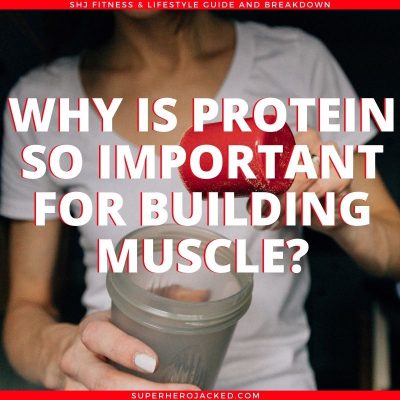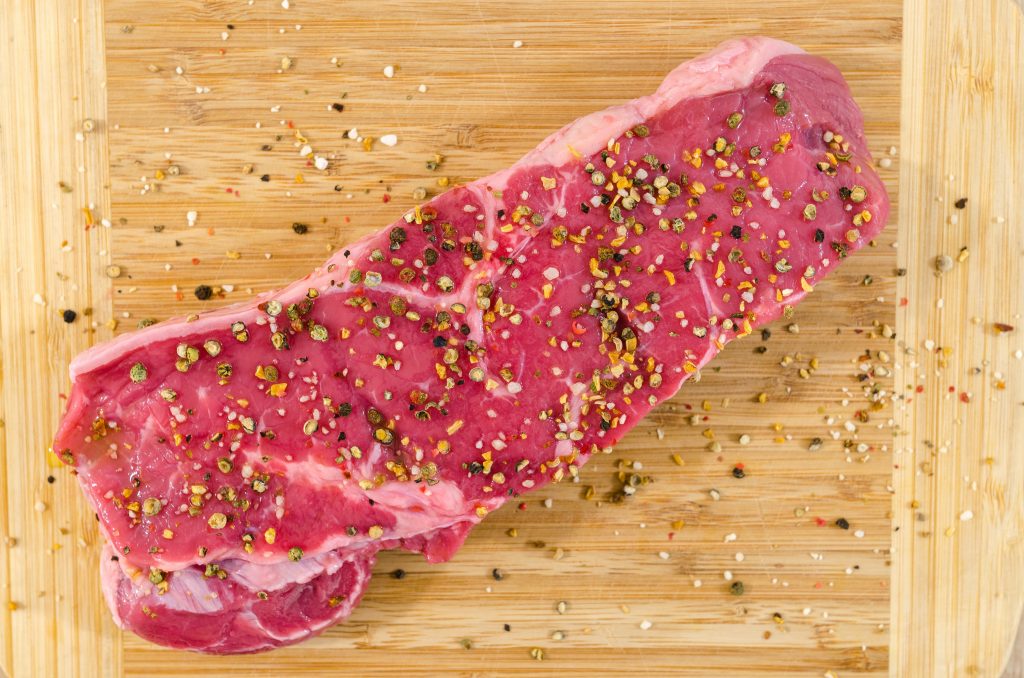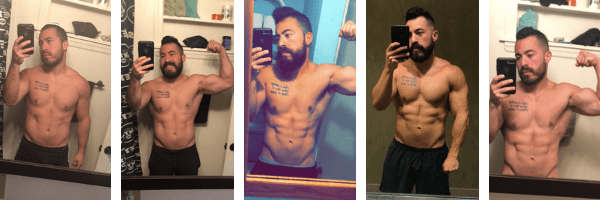 It’s a good question, though, isn’t it?
It’s a good question, though, isn’t it?
Like, why isn’t it actually some vitamins or some minerals that are the main components to building muscle?
Why is it that everyone talks about protein to be the number one thing to consume to build lean muscle?
Well, the good news is that it’s not just pseudo-science or bodybuilder talk, but it’s actually based on rock solid science, which this whole article will be addressing.
So let’s get into the science…
What is protein?
According to the US National Library of Medicine:
“Proteins are large, complex molecules that play many critical roles in the body. They do most of the work in cells and are required for the structure, function, and regulation of the body’s tissues and organs. Proteins are made up of hundreds or thousands of smaller units called amino acids, which are attached to one another in long chains. There are 20 different types of amino acids that can be combined to make a protein…”
Well, that was a mouthful.
It is one of the essential macronutrients alongside fat and carbohydrates. These macronutrients make up your daily caloric intake. We go into depth on these within our academy and nutrition classes, but all you need to know is that there are three macronutrients:
- Protein
- Carbohydrates
- Fats
…and one of them is protein.
Protein’s role in the body
So according to the above definition, we know that proteins are necessary for our body’s tissues and organs. It is required for the growth and maintenance of body tissue, including muscle, and is especially needed in higher quantities during illnesses, breastfeeding or even after exercise so the body can repair and recover from any damages since your body breaks down after exercise.
But it doesn’t stop there. In fact, on top of that, protein has many other benefits such as balancing stomach PH.
Some proteins even include keratin, which is structural protein found in hair, skin, and nails, while other proteins include collagen, which is another structural protein found in your bones, tendons, ligaments, and skin. Proteins help make you feel fuller for longer so you eat less, maintain heart health, respiratory function, and I can go on and on.
So we understand how important protein is in rebuilding muscle and other body tissue, particularly when your body muscles need repair after exercise.

Where does protein come from?
Proteins come from many food sources such as meats, fish, poultry, beans, nuts, seeds, and dairy products. You will obviously also find traces of it in other food sources as well. You can even read about our favorite protein powders and even sources of protein which we covered before.
You can even get your protein from protein powders. In fact, Spot Me Bro even has an article on the types of protein to consume based on your goals.
Muscle and protein relationship
WebMD recommends:
“Adults in the U.S. are encouraged to get 10% to 35% of their day’s calories from protein foods. That’s about 46 grams of protein for women, and 56 grams of protein for men.”
According to VeryWellFit:
“Muscle protein synthesis is a naturally occurring process in which protein is produced to repair muscle damage caused by intense exercise.
We understand that protein is essential for muscle building for athletes and that there’s really no alternative macro your body can use to repair itself other than protein. It’s the one macro that your body really needs for many vital body organs and tissues.
Studies show that stimulating muscle protein synthesis boosts muscle growth, endurance, and recovery, as well as increases performance.
How much protein should you have (the normal recommendation)?
A study by the University of Birmingham shows that having a 20g dose of protein after exercise increases muscle protein synthesis by 49%. We even covered studies which recommended the daily protein intake and we concluded that your daily protein intake should be 0.8g-1g per pound of body weight.
That means if your weight is 180 lbs., then your daily protein intake should ideally be around the 144g – 180g range.

Conclusion [A Special Note From Mike]
If you guys are part of The SHJ Army, then you know who Mike is (he’s our founder/Nick Fury around here).
Well, being that protein intake is such an important topic, we decided it only makes sense if he drops in and gives us a bit of information as well.
Here’s what he has for us about protein:
Protein has been one of the main pillars of Nutrition among SHJ since the very beginning. We have our Nutrition Pillars and now, aside from The Academy’s Nutrition Classes (there are over half a dozen dietary guidelines so members can build their own perfect regimen), we function based on our 4-Tier-Nutrition-System, which was built off research of hundreds and hundreds of celebrities (more detailed information in my book, Superhuman Secrets) to make the most efficient, effective, and sustainable nutrition system for building The Superhero Physique and unleashing your inner superhuman.
That being said, protein being one of those four tiers (and always having been front and center as one of our main pillars) should tell you how important it is.
Protein is not only a building block for muscle, but it also helps in multiple different ways. Protein will generally make and keep you more satiated; the muscle you build (or maintain) from having enough of it will, in turn, help you increase your fat burn. Keeping your intake high enough will drastically increase your muscle retention (and building), and it also helps you burn more calories throughout the day!
I know…crazy stuff.
That being said, it’s also important to note (if the things I mentioned didn’t sell you already) why protein intake is important for both gaining and losing weight.
When you gain weight, the purpose of tacking on the pounds is to hopefully pack on as much muscle weight as possible (generally people don’t go into “bulks” with the goal to gain fat). In order to accomplish this, we’ll need to worry about two things first and foremost: overall caloric intake, being that in order to gain weight of any sort, we’ll need to be in a caloric surplus, and also protein intake, being that in order to build muscle, we’ll need to utilize proteins to help us repair and build over time.
Now, on the other hand, we have losing weight, which in that case the goal would normally be FAT loss. Regardless of the overall goal (Superhero Physique or not), the healthiest way to build our body is to retain as much muscle as possible and shred off the fat. This is done in a caloric deficit, but it’s also important to keep your protein intake up in order to MAINTAIN the muscle you already have.
There are also three circumstances wherein people can actually build muscle while losing weight:
- They are obese and have a lot of weight to lose.
- They are new to resistance training.
- They are utilizing some form of performance enhancing drug (think Super Soldier Serum).
Now, many people who come to SHJ looking to change their lives and unleash their inner superhuman actually end up falling into one of the first two categories. So if it wasn’t already important enough to maintain your muscle while losing weight, then this should tell you why it is absolutely essential!
Oh, and the coolest part about all of this?
We have, of course, written an article or two talking about specific protein ranges that are the typical recommendations. And, Zak gave us another source right above this block as well.
These generally land somewhere around .8-1g per pound of body weight.
BUT, being that I’m not only a guinea pig tester, but now my team and beta testers here at The SHJ Army are right there with me always looking for the absolute best way to transform: we have tested different protein ranges for different goals for YEARS now and found that we can maintain and even build ample muscle are much different ranges than the normally suggested intake.
That’s the reason why our 4-Tier-Nutrition System inside our Superhuman System and The SHJ Nutrition System function on THREE ranges of daily protein intake depending on what will be the most efficient, effective, and sustainable way for you to maintain and even build your muscle to reach your goal.
So it’s important to be aware that protein is absolutely essential to your goals for multiple reasons, but it’s also important to note that it’s the portion of our 4-Tier-Nutrition-System that is mainly controlling (or at least helping) mainly with our muscle and fat relationship (how we lose fat and gain/retain muscle).
For that reason, you should realize that if your main goal is to lose weight your priority should be your caloric deficit. Protein is the next priority. In this case, if your daily goal is to eat less than 2,000 calories and eat more (or equal to) 125g of protein, the priority should be staying under 2,000 calories. So at the end of the day, if you are at 1,988 calories but only at 100g of protein, you do not want to be adding on another 120-200 calories from a protein shake to hit your protein. That’s second on your list of priorities if the goal is weight loss!
Keep track of your priorities for your specific goals, and if you need extra help, we’d love to have you inside any of our programs where you’re invited to work with me inside our Private Community throughout the course of your transformation.
———————————————————-
Well, instead of a special note, Mike essentially came in for a full-blown article-length-Ted-Talk with us on protein… but I think we needed it!
Clearly, we can take one thing from this: protein is extremely important for both building muscle AND unleashing our inner superhuman.
#####
Zak Mustapha
The Guy Who Drinks Tea
SHJ Team Member STARK
Join The Superhero Academy and start unleashing your inner SuperHuman.
———————————————————-
https://ghr.nlm.nih.gov/primer/howgeneswork/protein
https://www.healthline.com/nutrition/functions-of-protein#TOC_TITLE_HDR_5
https://www.verywellfit.com/muscle-protein-synthesis-and-muscle-growth-4148337
https://www.webmd.com/food-recipes/protein

SUPERHUMAN SECRETS V.2
NOW UPDATED AND EXPANDED WITH A NEW SECTION & SEVEN BONUSES
USD$29 USD$14.95

